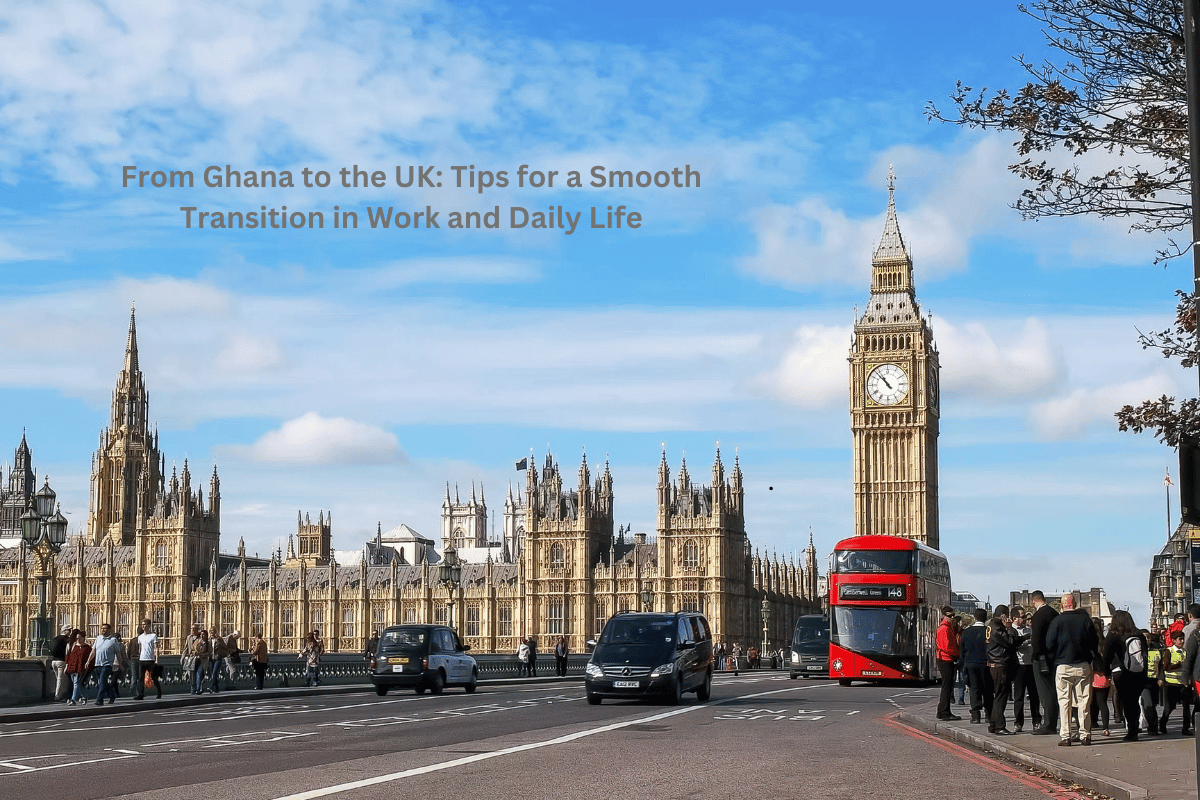From Ghana to the UK: Tips for a Smooth Transition in Work and Daily Life
Looking at the increased number of UK visa application, the Officer for National Statistics estimate that among 728,000 immigrants that have migrated to the UK in the year ending June 2024, Ghana makes up a major part of the immigrants.
There is always intense joy when you receive a positive response concerning your visa from the immigration officer knowing that you can now move to the UK. However, this changes are not without challenges as it requires careful planning and preparation.
You will need information on how to navigate cultural planning, the professional landscape, and the practicalities of daily life hence this article. The information in this article will arm you with pre-departure preparations, arrival and setting in, work and career, daily life in the UK, challenges you will face and how to overcome them.
Pre-Departure Preparations
You need to prepare for the following before you leave for the UK
- Visa and Immigration
- Financial Planning
- Accommodation
- Health and Insurance
- Packing and Essentials
Visa and Immigration
You can enter the UK through different visa categories such as the business visas, student visa, family visa, visitor visa, and work visa.
Before you apply for a visa, you need to consider where you are coming from, your personal circumstances andd skills, how long you want to stay for and why you want to come to the UK.
The above will help you choose the correct visa type. After which, you will complete an online application form, gather the required documents, book an appointment at a visa application center, provide your biometrics and supporting documents and pay the application fee.
If you want your chances for approval to be high, then ensure you do proper research even before you apply. Apply as early as possible so that if there is a delay, you will not miss your purpose for going to the UK.
Ensure that the documents you provide are complete and accurate (this has caused majority of applicants to be denied or accused of fraudulence). You have to show that you intend to return to your country by demonstrating strong ties to home.
During the interview, try to be as honest as possible cause any suspicion of lies could get your explanations discredited. Despite having these tips at the palm of your hands, it is important that you consult an immigration expert or attorney to guide you through the process.
Financial Planning
Regardless of your purpose for going to the UK, you will need enough funds to cover accommodation, transportation and food. Then, your specific purpose for going to the UK will determine just how much you need and if you will be paying utilities for a period of time.You will need a UK bank account to do any of the following – receive salaries from employers, pay bills, build credit history, establish a stable financial presence, and make everyday purchases.
UK bank accounts are usually opened after the immigrant has arrived in the UK.
After your arrival, you need to create a realistic budget highlighting your income and expenses (this will help you model your finances properly). You need to understand how the UK tax allowances and deduction system works.
If possible, exchange your Ghana cedis notes before you arrive to the UK. However, if you are not able to, you can make withdrawals at the airport using your mastercard.
Accommodation
As an immigrant, you may experience difficulty accessing proper housing in the UK due limited knowledge of how the system works. Sometimes, without considering cost, transport links and community, immigrants take houses in unfavourable locations.
To avoid this, you need to make provisions for temporary housing even before you leave Ghana. At least a place, to stay for two days to a week while you hunt for a suitable accommodation.
Depending on your financial capacity, you need to consider various housing options such as rental places or homes for sale. To find proper accommodation, you can search online to either find landlords who are renting and reach out to them directly, or find shared spaces and you can also go through agents.
Health and Insurance
The National Health Service (NHS) provides medical and healthcare services to all residents of the UK regardless of their income. It is majorly funded through general taxation and includes primary care (GP visits), mental health services, hospital treatment, dentistry, etc.
If you have a health problem in the UK, a General Practitioner (GP) would likely be your first contact hence the need to register with one. When you search online, you can find if a GP is currently accepting patients, their reception opening times and the reviews of their treatments.
Once you have found one close to where you live, you can fill out the online form on the app, the GP’s website or the GP’s profile page on the NHS website.
Packing and Essentials
Don’t allow your excitement while packing make you to carry unnecessary things while leaving behind the essentials. You need to carry all your documents such as your passport, visa, academic certificates, flight information, etc.
Don’t carry loads that will amount to more than the required weight else you will be asked to leave behind some items. The UK climate can be harsh so ensure to carry clothings that will protect you from the cold.
Arrival and Setting In
Once you arrive at the airport, you need to get cleared before properly entering the UK. Since, you are just arriving for the first time, it is advisable to take a taxi to the exact location you are going to.
While settling in, you need to register with the local council and obtain a National Insurance number (for work). Don’t forget to register with a GP; your health is important.
You may need to take a stroll in the evenings to familiarize yourself with the environment. Know how to get to the bus stops and when buses arrive. Simply put, familiarise yourself with the public transport system (train, buses, taxi, cars, etc).
You can join community groups and organizations such as the church, book clubs, local groups, social clubs, community centers etc.
If you can find and identify your fellow Ghanians, then make a conscious effort to belong to their community. You will definitely need the support.
There will be lots of culture shock that you need to be prepared for hence the need to understand British customs and etiquette.
Work and Career
You will need a job to make extra money (aside from the one you arrived with) so that you can handle your bills and buy groceries. Simple search on online job boards and contact recruitment agencies for job that fit your qualification and experience.
If you are still finding it difficult to find a job, then spread your tentacles by networking and attending career fairs. Tailor you CV and cover letter to suit the UK standards and increase your opportunity to be considered.
Most jobs will tell you the available working hours, shifts, holidays and the pay for each period. Anything you don’t understand, ensure to ask questions instead of assuming.
Check if your Ghanian qualifications are recognized in the UK, and if they are not, what you can do about it. Try to get UK professional accreditation and licensing so that you can get better jobs.
Daily Life in the UK
The day-to-day life of immigrants in the UK differ from person to person. However, the general things you may life to experience can be categorized to transportation, food and groceries, healthcare, and leisure and entertainment.
You will find that you need a UK driving licence either to own a car or to get a befitting job. You will discover where you can find Ghanain food and ingredients. Also, you will try out various British cuisine to know what you like or don’t.
As you shop, you will discover that what is obtainable in Ghanian supermarkets and during grocery shopping may not be obtainable in the UK.
You will also learn where you can get medication when you fall sick and how to access emergency healthcare services. If you are a parent, you have to enroll your children in schools (cause that is the law).
When you get overwhelmed with work, school and other activities, you will need to consider entertainment options such as museums, parks and cultural attractions.







